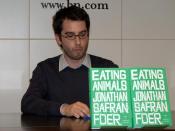Lopez 10
Lexus Lopez
AP Language Arts
Ms. Koher
18 August 2014
Eating Animals by Jonathan Safran Foer
Logos - the logic used to support a claim, can also be the facts and statistics used to help support the argument
Pathos - the emotional or motivational appeals; vivid language, emotional language and numerous sensory details, an appeal to an audience's sense of identity, their self-interest, their emotions
Logos
"You can call your turkey organic and torture it daily." (3.70)
Foer logically reasons that even though one may think that they are doing the right thing by paying more for organic foods or buying cage-free/free-range, they are oblivious to the fact that these labels don't have any relevance and are only there to exploit the consumer informing the consumer that all of this is meaningless.
"We need to explain that the parsley on the plate is for decoration⦠why we eat wings but not eyes, cows but not dogs." (1.12)
Foer claims that what we eat is solely centered on society and our food choices are heavily influenced by what others do around us. In America it would be considered a taboo to eat your dog when in reality dogs are just as important/equal to all other animals or to eat eyes when they are naturally just as nutritious, however most people are just accustomed to follow the norm instead of being practical and/or reasonable.
"Animal agriculture makes a 40% greater contribution to global warming than all transportation in the world combined; it is the number one cause of climate change." (3.43)
Foes uses statistics to not only inform the reader but to show the logical reasoning that changing the way we eat could help significantly reduce the globally-frightening event we are opt to avoid. If we continue ignoring the issue,


